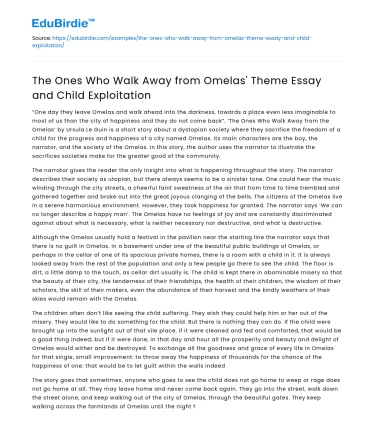“One day they leave Omelas and walk ahead into the darkness, towards a place even less imaginable to most of us than the city of happiness and they do not come back”. ‘The Ones Who Walk Away from the Omelas’ by Ursula Le Guin is a short story about a dystopian society where they sacrifice the freedom of a child for the progress and happiness of a city named Omelas. Its main characters are the boy, the narrator, and the society of the Omelas. In this story, the author uses the narrator to illustrate the sacrifices societies make for the greater good of the community.
The narrator gives the reader the only insight into what is happening throughout the story. The narrator describes their society as utopian, but there always seems to be a sinister tone. One could hear the music winding through the city streets, a cheerful faint sweetness of the air that from time to time trembled and gathered together and broke out into the great joyous clanging of the bells. The citizens of the Omelas live in a serene harmonious environment. However, they took happiness for granted. The narrator says ‘We can no longer describe a happy man’. The Omelas have no feelings of joy and are constantly discriminated against about what is necessary, what is neither necessary nor destructive, and what is destructive.
Save your time!
We can take care of your essay
- Proper editing and formatting
- Free revision, title page, and bibliography
- Flexible prices and money-back guarantee
Although the Omelas usually hold a festival in the pavilion near the starting line the narrator says that there is no guilt in Omelas. In a basement under one of the beautiful public buildings of Omelas, or perhaps in the cellar of one of its spacious private homes, there is a room with a child in it. It is always looked away from the rest of the population and only a few people go there to see the child. The floor is dirt, a little damp to the touch, as cellar dirt usually is. The child is kept there in abominable misery so that the beauty of their city, the tenderness of their friendships, the health of their children, the wisdom of their scholars, the skill of their makers, even the abundance of their harvest and the kindly weathers of their skies would remain with the Omelas.
The children often don’t like seeing the child suffering. They wish they could help him or her out of the misery. They would like to do something for the child. But there is nothing they can do. If the child were brought up into the sunlight out of that vile place, if it were cleaned and fed and comforted, that would be a good thing indeed; but if it were done, in that day and hour all the prosperity and beauty and delight of Omelas would wither and be destroyed. To exchange all the goodness and grace of every life in Omelas for that single, small improvement: to throw away the happiness of thousands for the chance of the happiness of one: that would be to let guilt within the walls indeed
The story goes that sometimes, anyone who goes to see the child does not go home to weep or rage does not go home at all. They may leave home and never come back again. They go into the street, walk down the street alone, and keep walking out of the city of Omelas, through the beautiful gates. They keep walking across the farmlands of Omelas until the night falls. They go west or north, towards the mountains, and leave Omelas into the darkness and do not ever come back.
In conclusion, this story describes a selfish utopian society that sacrifices the happiness of one child for the prosperity of all. The Omelas community exists in the idea of the need to exchange all the goodness and grace of every life in Omelas for that single, small improvement: to throw away the happiness of thousands for the chance of the happiness of one: that would be to let guilt within the walls indeed.






 Stuck on your essay?
Stuck on your essay?

